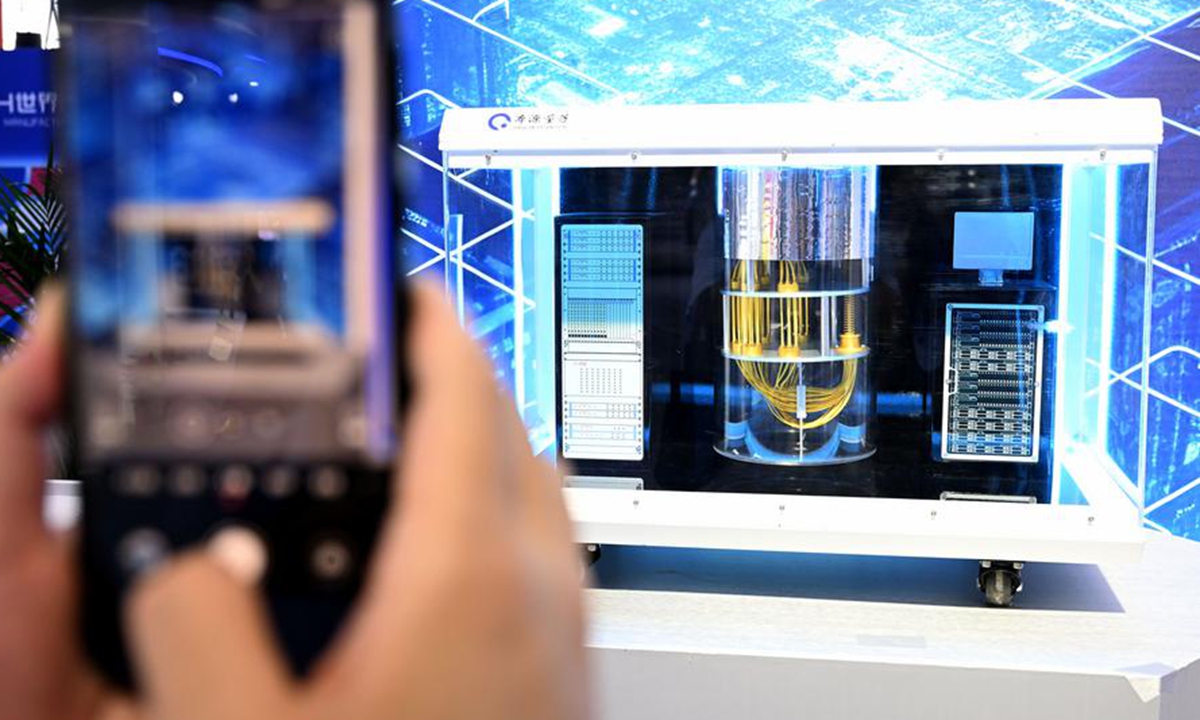Insider Brief
- China’s Origin Quantum launched its fourth-generation quantum control system, Tianji 4.0, marking a key step toward scalable production of hundred-qubit quantum computers.
- Tianji 4.0 enables more efficient, automated signal control for superconducting quantum chips, reducing reliance on highly specialized personnel.
- The new system builds on the success of Origin Wukong and is integrated into efforts to create a fully self-developed Chinese quantum computing ecosystem.
- A visitor takes photos of an Origin Wukong superconducting quantum computer model at the 2024 World Manufacturing Convention. (Xinhua)
China’s Origin Quantum has launched its fourth-generation quantum control system, a move signaling the country’s increasing push to industrialize and scale quantum computing capabilities.
The new system, dubbed Origin Tianji 4.0, supports over 500 qubits and serves as the central control for superconducting quantum computers, according to The Global Times, a media outlet under the Chinese Communist Party (CCP). The system, unveiled this week in Hefei, is positioned as a critical enabler for mass-producing quantum computers with more than 100 qubits.
The control system is considered the “neural center” of a quantum computer. It generates, acquires and controls the precise signals that manage quantum chips, which are the computational heart of a quantum system. With the Tianji 4.0 upgrade, Origin Quantum claims major improvements in integration, automation and scalability compared to its previous version, which powered the country’s third-generation superconducting quantum computer, Origin Wukong.

According to The Global Times, the new system marks a shift from research-heavy development to production-ready engineering. Tasks that once required PhD-level quantum physicists have now been standardized into procedures that can be executed by general engineers. The company says this streamlining is a prerequisite for quantum computers to be built in larger numbers and deployed across industries.
The rollout also reflects China’s growing investment in building a self-reliant quantum ecosystem. The company said Tianji 4.0 is integrated with four of Origin Quantum’s proprietary software platforms, enabling faster testing and adjustment of superconducting chips. These improvements are expected to reduce both the cost and time required to bring quantum machines online.
The Global Times reports that the system is currently being used to develop the next generation of quantum computers and is part of what the company calls a fully “China-controlled” quantum technology pathway. It positions the technology as a domestic alternative to efforts by U.S.-based quantum firms like IBM, Rigetti and Google.
Origin Wukong, the third-generation system, has reportedly handled more than 380,000 quantum computing tasks for 26 million users in 139 countries since going online in January 2023. According to The Global Times, users from the United States, Russia, Japan, and Canada are among the most active. The platform has drawn over 20 million visits globally.
With the debut of Tianji 4.0, Origin Quantum is signaling that China’s quantum sector is entering a phase of accelerated development and engineering standardization, company officials told the newspaper.
Guo Guoping, director of the Anhui Quantum Computing Engineering Research Center and chief scientist at Origin Quantum, told the Global Times, that the company is now preparing for the mass production of machines that can handle hundreds of qubits. This is still far from the million-qubit threshold needed for fault-tolerant quantum computing, but a significant step toward practical deployment.















